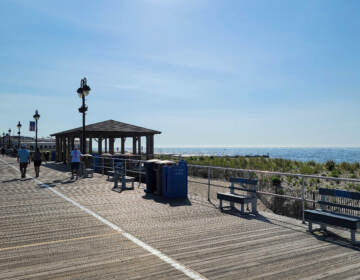Marine mammal experts rescue ‘cold-stunned’ sea turtles near Long Beach Island
The ongoing unseasonable cold snap is putting migrating sea turtles at risk of washing ashore on New Jersey beaches as either “cold-stunned” or dead, wildlife experts say.

Migrating sea turtles at risk of washing ashore on New Jersey beaches as either “cold-stunned” or dead, wildlife experts say. (Public domain)
The ongoing unseasonable cold snap is putting migrating sea turtles at risk of washing ashore on New Jersey beaches as either “cold-stunned” or dead, wildlife experts say.
The nonprofit Marine Mammal Stranding Center in Atlantic County’s Brigantine says they’ve received reports of what appears to be frozen green sea turtles in the Barnegat Bay near Long Beach Island.
But Bob Schoelkopf, who operates the center along with his wife, Sheila Dean, says the sea turtles may appear to be frozen but that doesn’t mean they’re dead.
The cold-blooded animals, suited for water temperatures between 75 and 85 degrees, are susceptible of becoming stunned in cold water as they migrate south before winter sets in.
“When sea turtles are in water that is below 55 degrees, their metabolism slows considerably and they become immobile. We ask that anyone who spots the turtles, to remove them from the water and put them in a quiet outdoor location,” Dean said.
The center is urging beachcombers to contact them if any sea turtles, which may appear dead, are spotted so that experts can respond and provide emergency care. The experts say that any attempt to warm the turtles could cause them to go into shock and possibly die.
Four turtles have been rescued and transported to Sea Turtle Recovery for long-term rehabilitation, according to the center.
The center, which relies on donations to operate, is encouraging residents to walk the beaches to collect trash and keep an eye out for any sea turtles.
Dean recommends the following:
- Check the wrack line (the line of debris and seaweed left by the tide) for any turtles or litter that may be buried within it.
- Do not attempt to warm a turtle up or move it, as you may end up doing more harm than good.
- Save the center’s number (609-266-0538) and call even if you think the turtle is dead. Staff will provide further instructions.
Marine mammal rescuers found around 190 frozen sea turtles in Cape Cod, Massachusetts last year after a sudden swing from mild to frigid air temperatures causing water temperatures to plummet.
WHYY is your source for fact-based, in-depth journalism and information. As a nonprofit organization, we rely on financial support from readers like you. Please give today.




